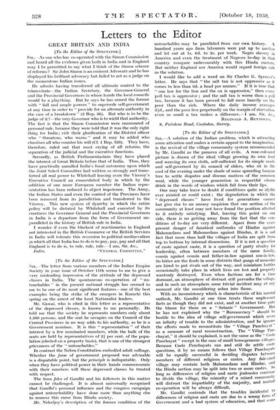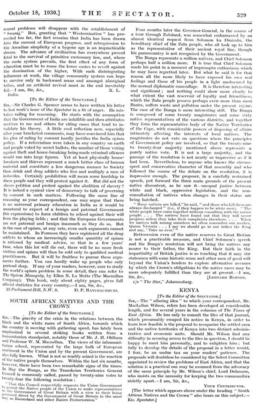[To the Editor of the SPECTATOR.] Sin,—A solution of the
Indian problem, which is attracting some attention and makes a certain appeal to the imagination, is the revival of the village community system recommended by Mr. Gandhi as the panacea of all evils. A rose-coloured picture is drawn of the ideal village growing its own food and weaving its own cloth, self-sufficient for its simple needs and self-governed by its council of elders, who sit in the cool of the evening under the shade of some spreading banyan tree to settle disputes and discuss matters of the common weal, while the younger generation in respectful silence drink in the words of wisdom which fall from their lips.
One may take leave to doubt if conditions quite so idyllic
ever existed or could exist ; the degradation in which the " depressed classes " have lived for generations cannot but give rise to an uneasy suspicion that one section of the community at least may not have found the position allotted to it entirely satisfying. But, leaving this point on one side, there is no getting away from the fact that the con- ditions of to-day are very different. Apart from the ever- present danger of fanatical outbreaks of Hindus against Mahomedans and Mahomedans against Hindus, it is a sad fact that more than half the villages of India are split from top to bottom by internal dissensions. If it is not a question of caste against caste, it is a question of party rivalry for leadership, often between members of the same family, cousin against cousin and father-in-law against son-in-law. So bitter are the feuds in some districts that gangs of assassins are hired to put rivals out of the way, and miniature battles occasionally take place in which lives are lost and property wantonly destroyed. Even when factions are for a time dormant, an atmosphere of distrust still pervades the village, and in such an atmosphere some trivial incident may at any moment stir the smouldering ashes into flame.
With an inconsistency which is characteristic of his mental outlook, Mr. Gandhi at one time treats these unpleasant facts as though they did not exist, and at another time puts the blame for them on a " Satanic " Government. But he has not explained why the " Bureaucracy " should be hostile to the idea of village self-government which saves an infinity of trouble to the administration, and he ignores the efforts made to reconstitute the " Village Panchayat" as a measure of rural reconstruction. The " Village Pan- chayat," it should be explained, is not the same as the " Caste Panehayat " except in the case of small homogeneous villages. Because Caste Panchayats can and still do settle caste questions, it by no means follows that Village Panchayats will be equally successful in deciding disputes between members of different religions or castes. Any fair-sized village may contain both Mahomedans and Hindus, and the Hindu section may be split into two or more castes. So long as differences of religion and caste jealousies continue to divide the village, the minority of a mixed community will distrust the impartiality of the majority, and mutual co-operation will be always difficult. Mr. Gandhi contends that the troubles incidental to differences of religion and caste are due to a wrong form of Government and a bad system of education, and that cone. raunal problems will disappear with the establishment of
swami," But, granting that " Westernization" has pro- ceeded too far, the fact remains that India has been drawn into the current of European progress, and retrogression to the Arcadian simplicity of a bygone age is an impracticable dream. The advance of civilization has everywhere proved fatal to the survival of primitive customary law, and, where the caste system prevails, the first effect of any form of education must be to rouse the lower castes to revolt against the domination of the higher, With such disintegrating influences at work, the village community system can hope to survive only in backward areas and amongst aboriginal tribes, and an artificial revival must in the end inevitably

























































 Previous page
Previous page